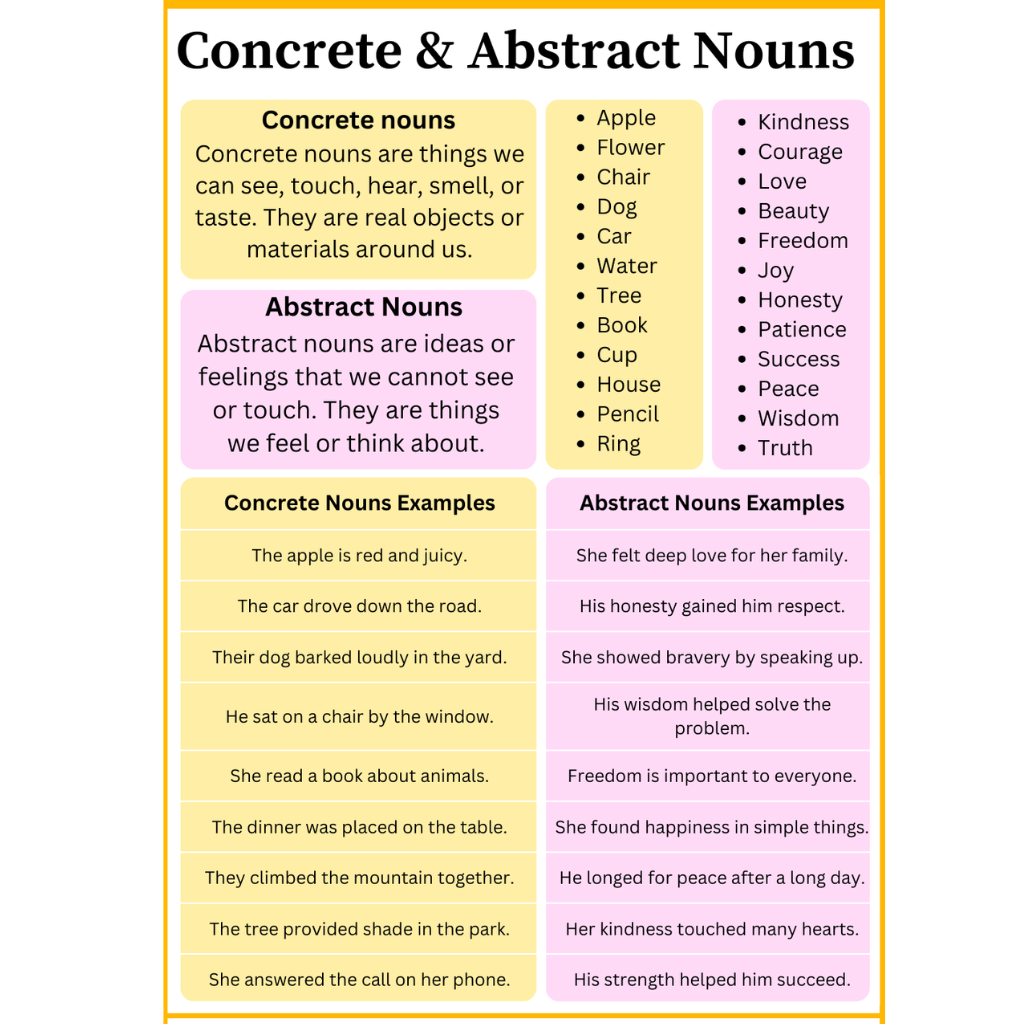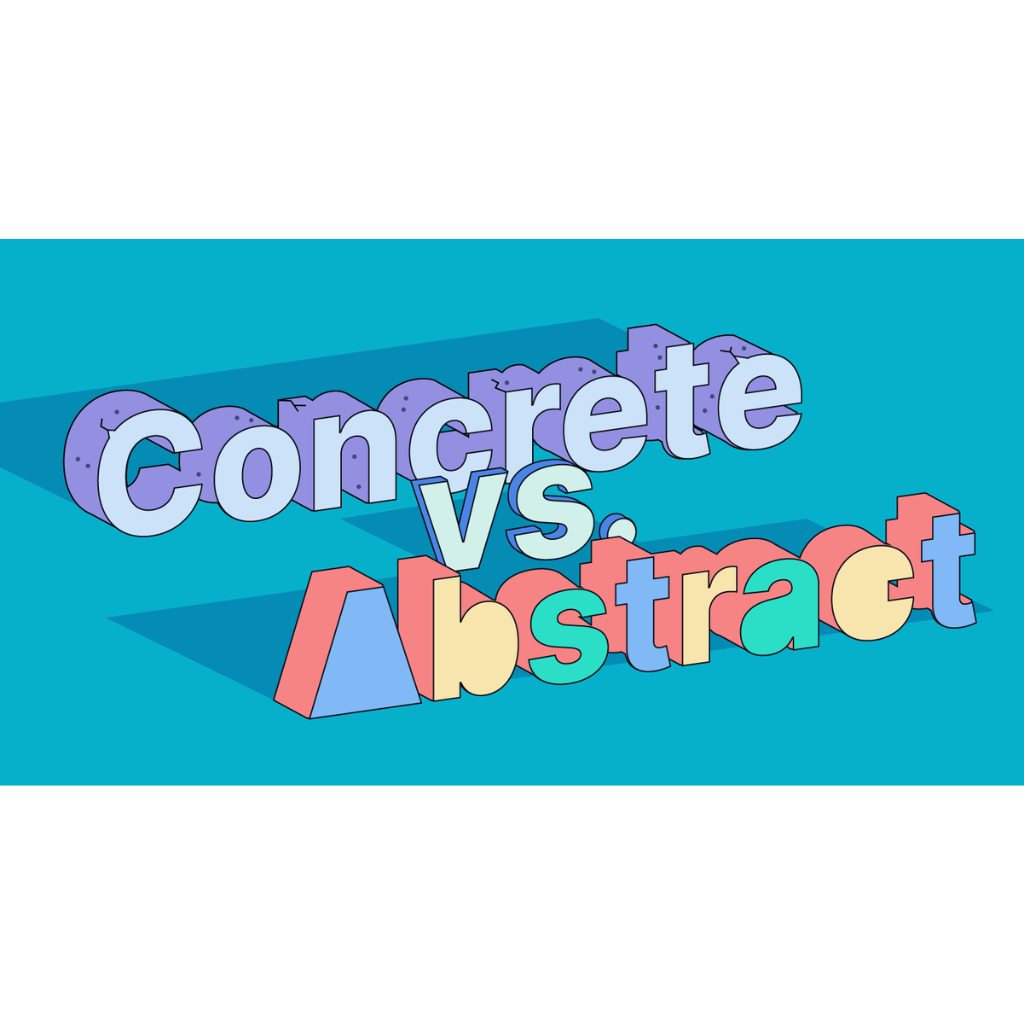Concrete nouns and abstract nouns, are two main types of nouns used to identify things in our world. Exploring their definitions and offering examples to illustrate their distinct roles in communication. Whether you’re a student honing your writing skills or just someone curious about language’s intricacies, understanding these two types of nouns will enhance your appreciation for how we express our thoughts and feelings. Join us as we unravel the significance of both kinds of nouns in everyday language.
What are Concrete and Abstract Nouns?
Concrete and abstract nouns both indicate objects or concepts, but they vary in the way we interact with or understand them. Let’s take a closer look at each category.
Concrete Nouns
Concrete nouns are words that describe items we can experience through our senses—like what we see, hear, taste, touch, and smell. They represent tangible objects or things that we can observe or physically interact with.
Examples of Concrete Nouns:
- Chair
- Cat
- Flower
- Chocolate
- Ocean
Concrete nouns refer to things we can see and touch; they are real and physical. This category includes items such as animals, objects, food, individuals, and locations. For instance, the word cat is a concrete noun since it represents something you can both observe and feel
Types of Concrete Nouns
Concrete nouns can be divided into two groups: countable and uncountable.
Countable Concrete Nouns
Countable nouns refer to items that can be counted one by one, such as a book, an apple, or a car.
Uncountable Concrete Nouns
Uncountable nouns refer to things that can’t be divided into separate parts, like water, air, or sand.
Examples in Sentences
| Sentence | Concrete Noun Highlighted |
|---|---|
| I see the sun setting. | Sun |
| She petted her Cat. | Cat |
| He bought a new phone. | Phone |
Abstract Nouns
Abstract nouns represent concepts that you can’t perceive through your senses. These include ideas, feelings, qualities, or notions that exist only in our thoughts. Unlike concrete nouns, abstract nouns cannot be seen, touched, tasted, smelled, or heard.
Examples of Abstract Nouns:
- Happiness
- Wisdom
- Freedom
- Courage
- Love
These nouns signify feelings, emotions, traits, or ideas instead of physical items. For example, love is considered an abstract noun since it isn’t something you can see or touch; however, it is something you can feel.
Types of Abstract Nouns
Abstract nouns refer to characteristics, feelings, and conditions of existence.
Quality-based Abstract Nouns
These words represent characteristics like being truthful, courageous, or smart.
Emotion-based Abstract Nouns
These words represent feelings such as happiness, rage, or anxiety.
Examples in Sentences
| Sentence | Abstract Noun Highlighted |
|---|---|
| She values honesty above all else. | Honesty |
| He showed great courage during the crisis. | Courage |
| Happiness is a key to a fulfilled life. | Happiness |

Key Differences Between Concrete and Abstract Nouns
| Feature | Concrete Nouns | Abstract Nouns |
|---|---|---|
| Definition | Things you can perceive with senses | Ideas, feelings, and qualities |
| Examples | Table, dog, flower | Happiness, love, courage |
| Tangible or Intangible | Tangible | Intangible |
| Countable/Uncountable | Can be both countable and uncountable | Generally uncountable |
| Perception | Perceived physically | Exists mentally or emotionally |
Why Understanding Concrete and Abstract Nouns is Important For ESL Students
For English learners, grasping the difference between concrete and abstract nouns can help clarify sentence meanings, enhance vocabulary, and improve comprehension in reading and writing.
Usage in Exams
Understanding these nouns is crucial for grammar exams, essays, and creative writing. Knowing the difference helps ESL students use the correct words to convey ideas effectively.
Concrete Nouns and Abstract Nouns Example Sentences
| Concrete Nouns | Abstract Nouns |
| The mangoes are delicious. | He doesn’t shows kindness to others. |
| She picked a ball. | he has courage to face the challenges. |
| He sat on the bed. | Life is very important than fame . |
| The lion roared loudly. | His IQ is high. |
| I see a yellow car. | Natural beauty is always praised. |
| She drinks cold coffee. | Freedom can make people happy. |
| The building is very tall. | She felt happiness today. |
| He deserves a gold medal. | Anger can destroy lives. |
| This novel is interesting. | She has always patience in her work. |
| There’s a book on the shelf. | Success comes with hard work. |
| Her house has a yard. | He finds peace in the garden. |
| The pencil broke. | Her richness is helpful. |
| She wears a locket. | Truth is always bitter. |
| His shirt is green. | Never compare religion with science. |
Concrete Noun List:
- Apple
- Flower
- Chair
- Dog
- Car
- Water
- Tree
- Book
- Cup
- House
- Pencil
- Ring
- Phone
- Laptop
- Shirt
- Bird
- Pen
- Door
- Road
Abstract Noun List:
- Kindness
- Courage
- Love
- Intelligence
- Beauty
- Freedom
- Joy
- Honesty
- Patience
- Success
- Peace
- Wisdom
- Happiness
- Truth
- Bravery
- Comfort
- Friendship
- Hope
- Creativity
- Justice
Tips for Identifying Concrete and Abstract Nouns
- Use Your Senses: If you can experience it through sight, touch, sound, taste, or smell, it’s a concrete noun.
- Consider Feelings and Concepts: If it describes a feeling, state of mind, or idea, it’s an abstract noun.
- Practice in Context: The best way to master nouns is to practice identifying them in sentences.
Exercises for Practice
Below are some exercises for practice to reinforce the concept:
Identify the Concrete and Abstract Nouns in Each Sentence:
- She felt immense joy after winning the award.
- The book on the table is hers.
- Wisdom comes with experience and age.
- The flowers in the garden are blooming.
Answers:
- Joy – Abstract
- Book, table – Concrete
- Wisdom, experience – Abstract
- Flowers, garden – Concrete
Frequently Asked Questions (FAQs)
Q1: Are all abstract nouns uncountable?
No, because some of the abstract nouns can be counted like, ”idea” or ”thoughts” .
Q2: Can a noun be both concrete and abstract?
No, a noun cannot be both concrete and abstract. Nouns are either concrete or abstract, and they are mutually exclusive groups.
Q3: Is “music” a concrete or abstract noun?
“Music” is a concrete noun because it can be heard, which is one of the five senses that can perceive concrete nouns.
Conclusion:
In all this journey of nouns and its two special types ”concrete” and ”abstract” noun, we learned about them and their uses in English sentences. Our site helped many ESL students to understand the difficult noun and its type and made it easy.

